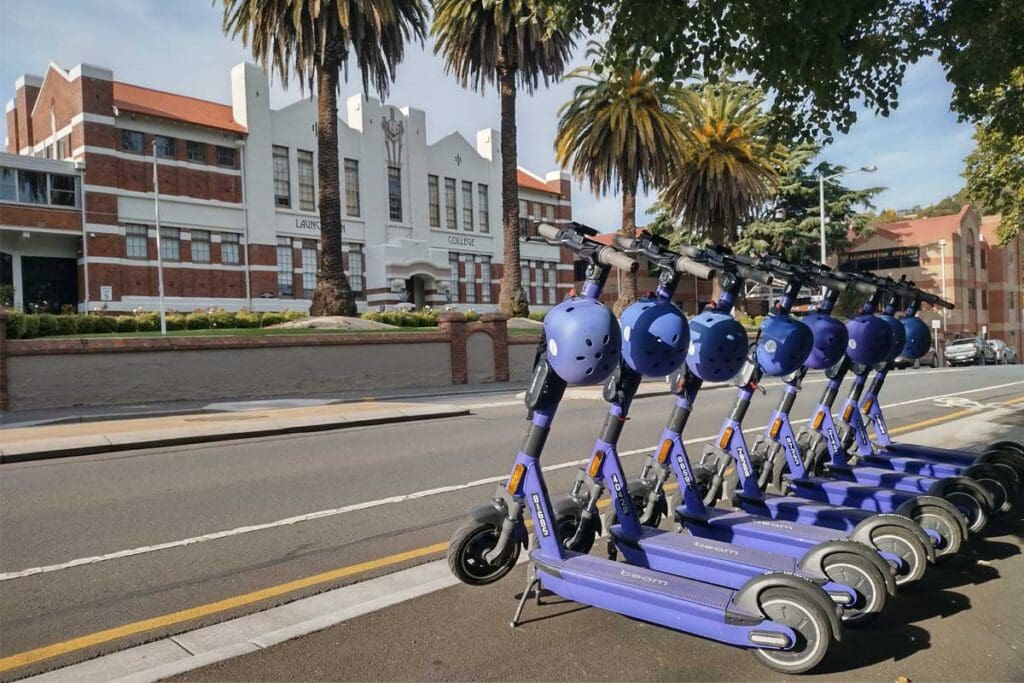Councils Teaming Up to Share Micromobility Knowledge

Launceston, Tasmania
A new micromobility information sharing network was launched last week for local government officials throughout Australia.
The Australian Local Government Micromobility (ALGM) group, hosted on the Microsoft Teams platform, was inspired by the growing number of Australian councils involved in e-scooter and e-bike share services. However, it is likely to become a source of shared knowledge and ideas on a wide range of micromobility issues relevant to local government, according to City of Launceston Smart Cities Project Officer Cameron Smith.
Cameron said he had been primarily motivated to start the group after receiving numerous enquiries about the council’s recently released evaluation report for its e-scooter share service trial.
“We published the evaluation roughly four weeks ago and it triggered enquiries from two Tasmanian councils looking to embark on their own trials soon – the Davenport and Clarence councils – and two other councils about to start their evaluation processes and looking for some tips,” he said.
“Soon after that, I was involved in a lengthy chain of emails looking at resourcing for councils as part of managing share services.
“It always seems to take more resourcing than councils anticipate at the start of their trials, so there’s some information sharing going on to look at what resourcing levels look like within a business-as-usual situation for share services.”
Cameron said ALGM would provide a go-to platform for those enquiries and discussions, and ensure those interactions would remain documented and easily accessible for future reference.
“Any council with a question about micromobility, particularly those that are new to the space, can reach out through the group and get advice or feedback from any other group member who can provide assistance,” he said.
“Our own investigations made us realise there is more to the bigger picture and there must be plenty of councils with valuable information.”
“As people join the group, they can refer back to previous discussions and reports that have been uploaded.
“While City of Launceston is currently in a position where we’re being approached to share our experiences, there was a point three or four months ago when we did a lot of reaching out to other councils who had already been through what we were encountering.
“We were fortunate we already had a network of several councils, including contacts we’d made at last year’s Micromobility Conference.
“But our own investigations made us realise there is more to the bigger picture and there must be plenty of councils with valuable information.”
He said ALGM would help bring all that experience together, which would save councils considerable time and resources by avoiding the same trial and error experienced by peers further down the micromobility path.
It should also speed up processes of innovation, as lessons and ideas are shared and workshopped.
For example, Cameron said feedback from Launceston council brought an innovation with share service provider Beam during its trial in the northern Tasmanian city.
The council suggested some members of the community might decide not to report incidents of poorly parked scooters because they didn’t want to go through the process of downloading Beam’s app.
In response, Beam began putting plates with unique QR codes on each scooter. People could scan the plate with their phone to automatically send a report to the Beam website, which immediately recognised which scooter was being reported and where it was located – along with any comment the community member might choose to add.
“The plates are tactile so they can easily be used by people with impaired vision, and we promoted the new process through our Access Advisory Committee,” Cameron said.
Initial Membership
“We’ll be keeping it open to discussions about trails, infrastructure and other topics as councils embed micromobility into their communities for the long term.”
Seventeen councils joined the group during its first week and Cameron expects many more will get involved as further local governments throughout Australia introduce share services and other micromobility activities.
“Share services are likely to be a dominant topic, at least initially, and I suspect it will be a forum for councils to share their trial evaluations,” he said.
“There are certainly a lot of topics to consider when evaluating a micromobiliy trial.
“However, it won’t just be looking at shared micromobility. We’ll be keeping it open to discussions about trails, infrastructure and other topics as councils embed micromobility into their communities for the long term.”
Local government officers keen to join the group can email Cameron at Cameron.Smith@launceston.tas.gov.au.
